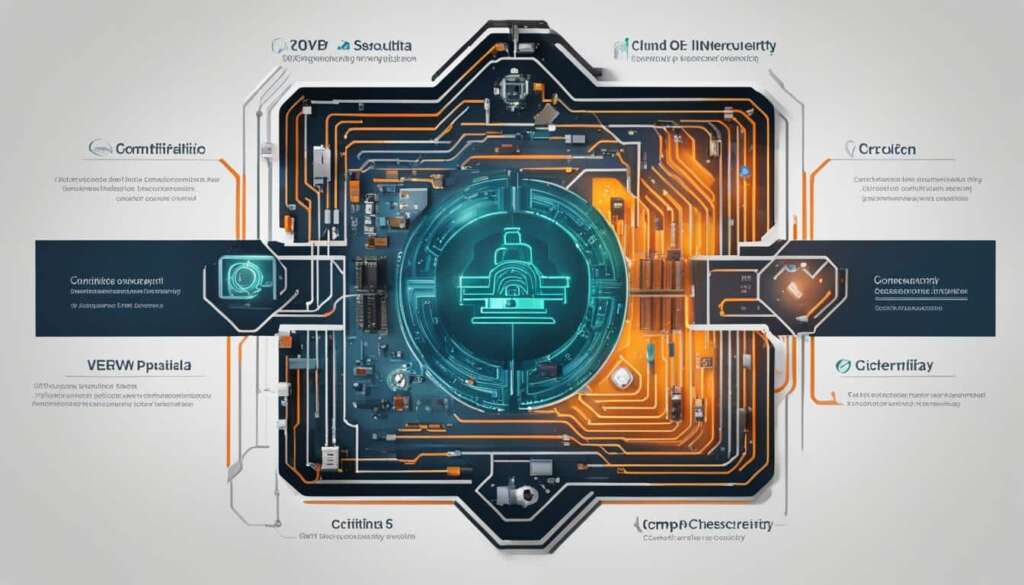Table of Contents
In recent years, the demand for cybersecurity professionals has increased significantly due to the rise in security breaches and cyber incidents. To establish expertise in the field and enhance career prospects, individuals are advised to follow a cybersecurity certification pathway. This article will provide information on the various certification options available and how they can help individuals choose a suitable cybersecurity career path.
In today’s digital landscape, cybersecurity is of utmost importance. With the increasing threats and vulnerabilities, organizations are in dire need of skilled professionals to protect their systems and data. A cybersecurity career offers great job prospects and opportunities for growth. However, to thrive in this field, it is crucial to have the right qualifications and certifications.
By obtaining the appropriate cybersecurity certifications, individuals can gain specialized knowledge, validate their skills, and stand out in the competitive IT security career market. These certifications not only enhance their technical abilities but also demonstrate their commitment to professional development.
This article will explore the different cybersecurity certification pathways and provide insights into the benefits they offer. Whether you are a beginner looking to enter the cybersecurity industry or an experienced professional aiming for career advancement, this guide will help you make informed decisions about your cybersecurity qualifications.
Continue reading to discover the various certification options available and choose the right path for your cybersecurity career success.
Understanding Cybersecurity Certification Paths
A cybersecurity certification path is a predefined sequence of certifications that individuals can follow to acquire the necessary skills and knowledge in the field of cybersecurity. These paths include a combination of entry-level, intermediate, and advanced certifications, which help individuals build a solid foundation and progress in their cybersecurity careers. These certifications cover various aspects of cybersecurity, including network security, risk management, penetration testing, and more.
By following a cybersecurity certification path, individuals can gain expertise in specific areas of cybersecurity and demonstrate their competency to potential employers. These paths provide a structured approach to learning, ensuring that individuals acquire the essential skills and knowledge needed to excel in the field.
To choose the right cybersecurity certification path, individuals should consider their career goals, interests, and the specific requirements of the cybersecurity job market. It is essential to research the different certification options available and understand the skills and knowledge they offer. By aligning their certification path with their career aspirations, individuals can increase their chances of success in the cybersecurity industry.
Cybersecurity Certification Path Example
| Certification Level | Certifications |
|---|---|
| Entry-Level |
|
| Intermediate-Level |
|
| Advanced-Level |
|
A cybersecurity certification path typically starts with entry-level certifications such as CompTIA Security+ or SSCP. These certifications provide a solid foundation in cybersecurity fundamentals. As individuals gain experience and expertise, they can move on to intermediate-level certifications like CompTIA CySA+ or CEH, which delve deeper into specific cybersecurity domains. Finally, advanced-level certifications such as CISSP or CISM validate an individual’s mastery in multiple areas of cybersecurity, making them eligible for senior-level cybersecurity roles.
It’s important to note that this example is just one of many possible certification paths. The specific certifications chosen may vary depending on an individual’s interests, career goals, and the requirements of the cybersecurity job market. Researching and seeking guidance from industry professionals can help individuals tailor their certification path to their unique needs.
Benefits of Cybersecurity Certifications
Obtaining cybersecurity certifications offers numerous benefits to individuals looking to advance their careers in the field. These certifications provide an opportunity to learn and upgrade cybersecurity skills, increase employment prospects, gain mastery in specialized domains, and command higher salaries. Additionally, certifications demonstrate a commitment to professional development and validate an individual’s expertise in cybersecurity.
By acquiring cybersecurity certifications, professionals enhance their knowledge and expertise in the rapidly evolving field. These certifications provide structured training and education, ensuring individuals are equipped with the latest techniques and best practices in cybersecurity. They cover various aspects of cybersecurity, such as network security, incident response, and ethical hacking, allowing individuals to specialize in their area of interest.
“Cybersecurity certifications not only validate skills but also serve as a testament to an individual’s dedication and commitment to the profession. Employers often look for certified professionals as they offer a higher level of competence and demonstrate a strong foundation in the field. Having certifications can open doors to better job opportunities and career growth.”
Moreover, certifications act as a benchmark for employers during the hiring process. They provide a standardized measure of an individual’s capabilities and qualifications, making it easier for employers to evaluate candidates. Certified professionals stand out in competitive job markets and have an edge over non-certified candidates.
| Certification | Description |
|---|---|
| CompTIA Security+ | A foundational certification covering network security and risk management. |
| Certified Ethical Hacker (CEH) | Focuses on ethical hacking techniques and countermeasures. |
| CISSP (Certified Information Systems Security Professional) | Recognized globally, it covers a broad range of cybersecurity domains. |
In conclusion, cybersecurity certifications provide numerous advantages to professionals looking to excel in the field. They enhance skills, increase job prospects, and validate expertise. With the ever-growing importance of cybersecurity, obtaining certifications is crucial for career advancement and staying competitive in the industry.
Entry-Level Cybersecurity Certifications
For individuals starting their cybersecurity careers, entry-level certifications provide a solid foundation of knowledge and skills. These certifications are designed to validate an individual’s understanding of cybersecurity fundamentals and their ability to implement best practices in a professional setting.
There are several entry-level cybersecurity certifications that are highly regarded in the industry. Some of the most popular ones include:
“CompTIA Security+: “ This certification covers network security, IT risk management, and system administration. It is widely recognized and a great starting point for those new to the field.
“SSCP: “ The Systems Security Certified Practitioner certification focuses on monitoring and responding to cybersecurity incidents. It demonstrates a candidate’s ability to implement and manage security controls.
“Certified Ethical Hacker (CEH): “ This certification is specifically designed for ethical hackers. It equips individuals with the knowledge and skills needed to identify vulnerabilities and exploit them, helping organizations improve their security posture.
“EJPT: “ The eLearnSecurity Junior Penetration Tester certification provides hands-on training in penetration testing. It emphasizes practical skills and allows individuals to demonstrate their ability to identify and exploit vulnerabilities.
By obtaining one or more of these entry-level certifications, individuals can kickstart their cybersecurity careers and position themselves for further growth and advancement in the field.
| Certification | Description |
|---|---|
| CompTIA Security+ | This certification covers network security, IT risk management, and system administration. |
| SSCP | The Systems Security Certified Practitioner certification focuses on monitoring and responding to cybersecurity incidents. |
| Certified Ethical Hacker (CEH) | This certification is specifically designed for ethical hackers. |
| EJPT | The eLearnSecurity Junior Penetration Tester certification provides hands-on training in penetration testing. |
Intermediate-Level Cybersecurity Certifications
Intermediate-level cybersecurity certifications are an important stepping stone for individuals seeking to advance their careers in the field of cybersecurity. These certifications build upon the foundational knowledge obtained from entry-level certifications and provide more specialized expertise. Three notable intermediate-level certifications in the industry are CompTIA CySA+, CompTIA PenTest+, and eCPTXv2.

CompTIA CySA+
CompTIA CySA+ is a valuable certification for individuals looking to focus on security analytics and response. This certification covers topics such as vulnerability management, threat intelligence, and incident response. By obtaining this certification, professionals demonstrate their ability to identify and analyze security threats, develop effective response plans, and implement strategies to protect organizational assets.
CompTIA PenTest+
CompTIA PenTest+ is designed for individuals who want to specialize in penetration testing. This certification validates the skills required to plan, conduct, and analyze penetration tests and vulnerability assessments. With a focus on hands-on skills, professionals with this certification are equipped to identify potential weaknesses in systems and networks and provide recommendations for remediation.
eCPTXv2
eCPTXv2, offered by eLearnSecurity, is an advanced certification for experienced penetration testers. This highly practical certification focuses on real-world scenarios and provides individuals with the knowledge and skills required to conduct advanced penetration tests against corporate networks. With eCPTXv2, professionals can demonstrate their ability to uncover critical vulnerabilities and provide actionable recommendations to improve an organization’s overall security posture.
These intermediate-level certifications offer professionals the opportunity to gain specialized skills and knowledge in specific areas of cybersecurity. By obtaining these certifications, individuals can enhance their career prospects, increase their earning potential, and contribute to the overall security of organizations.
Senior-Level Cybersecurity Certifications
In the field of cybersecurity, senior-level certifications are highly valued and serve as a testament to an individual’s expertise and experience. These certifications are designed for professionals who have already established themselves in the industry and are seeking to further enhance their knowledge and skills. Some of the most recognized senior-level certifications include CISSP, CISM, CRISC, and GIAC Security Expert (GSE).
CISSP, or Certified Information Systems Security Professional, is a globally recognized certification that covers various domains of cybersecurity, including security and risk management, asset security, and network security. It validates an individual’s ability to design, implement, and manage effective cybersecurity programs.
CISM, or Certified Information Security Manager, focuses on information security management, governance, and risk assessment. It is ideal for professionals who are responsible for managing and overseeing an organization’s information security program.
CRISC, or Certified in Risk and Information Systems Control, is designed for professionals who specialize in IT risk management and control. It emphasizes the identification and assessment of information technology risks and the implementation of risk mitigation strategies.
GIAC Security Expert (GSE) is an advanced certification that covers a wide range of cybersecurity skills and knowledge. It requires candidates to demonstrate their expertise in various areas, including penetration testing, incident response, and malware analysis.
Comparison of Senior-Level Cybersecurity Certifications
| Certification | Focus Area | Recognition |
|---|---|---|
| CISSP | Designing and implementing cybersecurity programs | Widely recognized globally |
| CISM | Information security management and governance | Valued by employers globally |
| CRISC | IT risk management and control | Recognized for expertise in risk assessment |
| GSE | Wide range of cybersecurity skills | Prestigious certification in the industry |
These senior-level certifications not only validate an individual’s expertise but also open doors to new career opportunities. They showcase a professional’s commitment to continuous learning and professional development and provide a competitive edge in the cybersecurity job market. Professionals who hold these certifications are highly sought after by employers who recognize the value they bring to their organizations.
Top Cybersecurity Certifications in the Industry
The cybersecurity job market is highly competitive, with organizations prioritizing the hiring of certified professionals who possess the necessary expertise to protect sensitive data and secure systems. Having the right cybersecurity certifications can significantly enhance your job prospects and open doors to exciting career opportunities in the field. Here are some of the top cybersecurity certifications that are highly sought after by employers:
CompTIA Security+
This entry-level certification is widely recognized and provides a solid foundation in cybersecurity principles and best practices. It covers topics such as network security, cryptography, and incident response. CompTIA Security+ is ideal for individuals looking to start their career in cybersecurity.
CISSP – Certified Information Systems Security Professional
CISSP is one of the most prestigious certifications in the cybersecurity industry. It validates an individual’s expertise in designing, implementing, and managing a robust cybersecurity program. CISSP covers various domains, including security and risk management, asset security, and software development security.
CISM – Certified Information Security Manager
CISM is specifically designed for professionals involved in information security management. It emphasizes the strategic management aspects of cybersecurity and covers areas such as information risk management, governance, and incident management. CISM is highly regarded and demonstrates a candidate’s ability to develop and manage an enterprise’s information security program.
CEH – Certified Ethical Hacker
The CEH certification is focused on ethical hacking and teaches individuals to think like hackers to identify vulnerabilities and secure systems effectively. CEH covers various hacking techniques, including reconnaissance, scanning, and exploitation.
SSCP – Systems Security Certified Practitioner
SSCP is an intermediate-level certification that validates an individual’s knowledge and skills in implementing, monitoring, and administering IT infrastructure. It covers topics such as access controls, cryptography, and incident response. SSCP is ideal for professionals seeking to advance their careers in cybersecurity.

| Certification | Description |
|---|---|
| CompTIA Security+ | An entry-level certification covering network security and risk management. |
| CISSP – Certified Information Systems Security Professional | A prestigious certification validating expertise in designing and managing cybersecurity programs. |
| CISM – Certified Information Security Manager | Focused on information security management and strategic aspects of cybersecurity. |
| CEH – Certified Ethical Hacker | Emphasizes ethical hacking techniques to identify and secure vulnerabilities. |
| SSCP – Systems Security Certified Practitioner | Validates knowledge in implementing and administering IT infrastructure. |
Benefits of Certification in the Cybersecurity Job Market
Certification plays a crucial role in the cybersecurity job market. Employers in the industry place high value on certifications as they provide assurance of an individual’s skills and knowledge in the field. Certified professionals have a competitive edge over their non-certified counterparts, making them more likely to secure job opportunities and receive higher salaries.
Having a certification demonstrates a commitment to continuous professional development and validates an individual’s expertise in cybersecurity. It showcases the dedication to staying updated with the latest industry trends, technologies, and best practices. This commitment to learning and growth is highly valued by employers, who seek professionals that can effectively mitigate cybersecurity risks.
Moreover, certifications contribute to career growth by opening doors to specialized roles within the cybersecurity industry. As individuals progress through different levels of certifications, they acquire specialized skills and knowledge in areas such as network security, penetration testing, risk management, etc. These specialized skills allow professionals to take on challenging roles, such as cybersecurity architects, incident response analysts, or security consultants.
In summary, earning certifications in the cybersecurity field provides several benefits in the job market. It increases employability, helps secure job opportunities, and commands higher salaries. Certifications also demonstrate a commitment to continuous learning and open doors to specialized career paths within the cybersecurity industry.

Table: Top Cybersecurity Certifications in Demand
| Certification | Description |
|---|---|
| CompTIA Security+ | A widely recognized entry-level certification covering network security, risk management, and system administration. |
| CISSP | A senior-level certification demonstrating expertise in designing and implementing cybersecurity programs. |
| CISM | A senior-level certification focusing on information security management. |
| CEH | An entry-level certification for ethical hackers, covering various types of cyberattacks. |
| SSCP | An entry-level certification focused on monitoring and responding to cybersecurity incidents. |
Conclusion
Choosing the right cybersecurity certification pathway is essential for individuals looking to establish a successful career in the field. By following a defined certification path and obtaining relevant certifications, individuals can enhance their skills, increase employability, and advance their cybersecurity careers. It is important to consider personal interests, career goals, and the requirements of the cybersecurity job market when selecting certifications. With the right certifications, individuals can secure a bright future in the ever-growing field of cybersecurity.
When it comes to cybersecurity certification pathways, the options are vast. From entry-level certifications like CompTIA Security+ and SSCP to intermediate-level certifications like CompTIA CySA+ and CompTIA PenTest+, and senior-level certifications like CISSP and CISM, there is a certification for every stage of your cybersecurity career. The cybersecurity job market is booming, and certified professionals are in high demand. By choosing the right certification pathway and obtaining the necessary qualifications, individuals can unlock exciting job prospects and pave their way to cybersecurity career success.
Successful cybersecurity professionals understand the importance of continuous learning and staying up-to-date with the latest industry trends. Certifications provide a structured approach to gaining knowledge and skills, validating expertise, and staying competitive in the cybersecurity job market. Whether you’re just starting your cybersecurity journey or looking to advance your existing career, investing in the right certifications can significantly boost your chances of success. So, take the time to explore the various cybersecurity certification pathways, choose the right certification for your goals, and embark on a rewarding cybersecurity career.
FAQ
What is a cybersecurity certification path?
A cybersecurity certification path is a predefined sequence of certifications that individuals can follow to acquire the necessary skills and knowledge in the field of cybersecurity.
Why should I obtain cybersecurity certifications?
Obtaining cybersecurity certifications offers numerous benefits, including the opportunity to learn and upgrade cybersecurity skills, increase employment prospects, gain mastery in specialized domains, and command higher salaries. Certifications also demonstrate a commitment to professional development and validate expertise in cybersecurity.
What are some popular entry-level cybersecurity certifications?
Some popular entry-level certifications include CompTIA Security+, Systems Security Certified Practitioner (SSCP), Certified Ethical Hacker (CEH), and eLearnSecurity Junior Penetration Tester (EJPT).
What are some intermediate-level certifications in cybersecurity?
Examples of intermediate-level certifications include CompTIA Cybersecurity Analyst (CySA+), CompTIA Penetration Testing+ (PenTest+), and eLearnSecurity Certified Professional Penetration Tester (eCPTXv2).
What are some senior-level cybersecurity certifications?
Notable senior-level certifications include Certified Information Systems Security Professional (CISSP), Certified Information Security Manager (CISM), Certified in Risk and Information Systems Control (CRISC), and GIAC Security Expert (GSE).
Which cybersecurity certifications are in high demand in the job market?
Some of the top cybersecurity certifications sought after by employers include CompTIA Security+, CISSP, CISM, CEH, and SSCP.
What role do certifications play in the cybersecurity job market?
Certifications play a crucial role in the cybersecurity job market as they provide assurance of an individual’s skills and knowledge in the field. Certified professionals have a competitive edge, are more likely to secure job opportunities, and receive higher salaries. Certifications also contribute to career growth and open doors to specialized roles within the cybersecurity industry.
How do I choose the right cybersecurity certification pathway?
When selecting certifications, it is important to consider personal interests, career goals, and the requirements of the cybersecurity job market. By following a defined certification path and obtaining relevant certifications, individuals can enhance their skills, increase employability, and advance their cybersecurity careers.
Source Links
- https://www.knowledgehut.com/blog/security/cybersecurity-certification-path
- https://www.coursera.org/articles/popular-cybersecurity-certifications
- https://www.comptia.org/blog/what-are-the-best-cybersecurity-certifications













